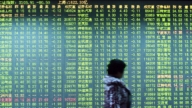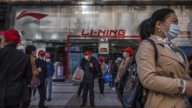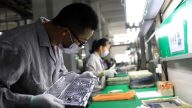【新唐人2012年1月6日讯】统计显示,2011年,股民人均亏损至少4.2万元以上,基金总亏损超过4000亿元。与此形成鲜明对比的是,2011年通过“首次公开招股IPO”方式,培育了近千名亿万富豪。学者认为,中国没有建立起信用体系,不具备跑股市基础。
2011年中国股市大“跳水”,A股流通市值锐减近2万9千亿元,资金净流失7868亿元,上证综合指数下跌22%。全年股民人均亏损超过4.2万元,如果考虑持仓和空仓账户,今年参与炒股的股民实际亏损可能还要翻倍。
事实也如此。在新浪财经的2011年投资收益调查中,超过34%的股民被腰斩,89%出现投资亏损。
北京学者彭定鼎认为,原来的股市市值与价值不符,这是股市走向健康的表现。
彭定鼎 :“这是股市回归正常,中国的股市一直是以投机的程序运作的。实际上股票的价格是由投机资本来决定的。现在是正常现象。”
自由撰稿人荆楚则认为,中国已经形成的股市泡沫必然要破灭,股市下跌是回到股市本身价值的表现。
不过,今年在亿万股民亏钱流泪的同时,中国股市却批量制造了大批富翁,差不多每天“诞生”三个亿万富豪。A股也成为上市公司高管及其关联人员的“提款机”,特别是中小板、创业板更是如此。今年以来,沪深两市累计套现资金已高达880亿元。
经济学者巩胜利:“中国的股市上市的刹那间,都是一个圈钱的过程。所有的上市公司的一些股东,1000名造富的人员,这都是上市圈钱刹那的一些个别人,这是体制造成的。”
巩胜利认为,中国近9成股民亏损,说明中国大部分是机构在操作,这包括大量的上市公司、股份制公司、风险基金和外来的投资资本。股份制公司一上市的刹那间就是造富过程。
统计资料也证明了这一点。2011年深沪两市共有276支新股上市,为全球第一,但超过六成新股目前已“破发”—-在股票发行上市当天就跌破发行价。
彭定鼎则认为,是因为国有资产转移制造了成千上万的富翁。只要权利和资本相结合,就会出现这种现象,这在中国今后还会进行下去。
荆楚还表示,中国目前不具备跑股市的社会基础,因为股市本来就是靠信用制度,而中共是靠坑蒙拐骗、暴力威胁统治社会的,哪来的社会信用体系?
荆楚:“中国的情况比较特殊在哪里,股市的投机性太强了。他不具备社会的信用体系。90%以上的人是投机,只有10%左右的人在投资,这样的投机性,不出问题才怪呢。”
虽然中国股市惨不忍睹,但中国证监会主席郭树清日前表示,不存在救市这个概念,市场有它自己的运行规律。
巩胜利:“证监会主席郭树清,他用的手段其实是非常有限的,因为,第一他不能动用国家的资本,第二,银行业的现金流他也没办法动,第三,包括国家的主权基金他也没有办法动。”
巩胜利说,股市健康需要制度来支撑,所以,郭树清是没有办法做决定的。但2012股市下滑趋势会更大。
而荆楚认为,救市需要把暗箱操作揭露出来,对坑蒙拐骗的行为要惩罚,这就需要放开媒体,但这恰恰是中共的软肋,它也不敢这么做,所以根本无法救市。
新唐人记者秦雪、宋风、萧宇采访报导。
**************
China’ Stock 2011: Hundreds of Millions Lost Money
Statistics show that in 2011, the loss of China’s stock traders
exceeded over 42,000 RMB per capita.
The overall loss was over RMB 400 billion. In sharp contrast,
the IPO in 2011 generated nearly a thousand billionaires.
Scholars comment that China has not set up a credit system,
and is running the stock market without a foundation basis.
China’s stock market plunged in 2011.
A-share’ market value dropped by nearly RMB 2.9 trillion,
plus net capital loss of RMB 786.8 billion.
The Shanghai Composite Index fell by 22%.
The per capita loss exceeded over RMB 42,000 in the year.
If adding current holdings and positions that are already sold,
losses suffered by stock traders can double this amount.
Sina Finance’s 2011 investment Income survey shows,
that over 34% of stock investors suffered a 50% loss, with 89% ending up with some investment losses.
Beijing-based scholar Peng Dingding says that in the past,
the stock prices did not reflect their fair values;
(price decline) is necessary if stock market returns to a
normal status.
Peng Dingding: “This is the stock market returning to normal.
China’s stock market has long been running on speculation.
The stock prices in fact relied on speculative capital.
Now it is in a state of normalizing."
Freelance Jing Chu believes that the burst of China’s
stock market bubble is inevitable.
The fall of stock market demonstrates
a return to its correct value.
In 2011, hundreds of millions investors lost money,
while newly rich were mass-produced in China.
Almost every day there were three new billionaires.
A-share listed-companies became ATMs
for their executives and associates.
For the past year, Shanghai and Shenzhen cash funds
have accumulated up to RMB 88 billion.
Gong Shengli (Economist): “When stocks go public in China,
it is a process of instant money misappropriation.
The beneficiaries are shareholders of the listed companies,
and those who are in the top 1000 rich list,
This is caused by China’s institutional system."
Gong Shengli says, nearly 90% of China’s stock traders had
losses, indicating the stock market is operated by organizations.
They include large number of listed companies, joint-stock
companies, venture capital funds and foreign investment.
For example, a joint-stock company begins to make money
the instant it goes public.
According to 2011 statistics, Shenzhen and Shanghai had
a total of 276 IPOs, making them the world’s No. 1.
However, over 60% of these IPOs traded below issue price
on the same day of issuing and listing stocks.
Peng Dingding thinks that the transfer of state-owned assets
created thousands of millionaires.
The combination of officials’ power and capital gave rise
to this phenomenon, which will continue in the future.
Jing Chu adds that the current China
has no sound social basis to run stock market.
This is because the stock market
should be based on a credit system.
Chinese Communist Party (CCP) has long relied on cheating,
lies, and violence, how can it set up a social credit system?
Jing Chu: “China’s stock market exists due to speculations.
It has no credit system basis.
Over 90% of the stock traders are speculative,
only the rest 10% are true investors
With such an extent of speculation,
it would be strange if no problems occur."
China’s stock market is in dismay, yet Guo Shuqing, China
Securities Regulatory Commission’ (CSRC) head, disagrees.
Recently he said, there is no such a concept of rescuing
the market, the stock market has its own operating rules.
Gong Shengli: “Guo Shuqing’s approach is very limited.
Because firstly, he cannot tap the nation’s capital;
secondly, he can’t touch the bank’s cash flow; and thirdly,
he can’t use the country’s sovereignty wealth funds."
Gong Shengli says that the stock market needs to develop
on the basis of a healthy system.
In this sense, CSRC’s head has no way to make a decision.
Gong thinks in 2012, China’ stock market will decline further.
Jing Chu believes that rescuing the stock market requires
exposing covert operations and frauds, and punish cheaters.
However, this would mean China’s media to open up
and be free, which is a sensitive issue for CCP.
The regime dares not open up the media,
thus it is simply unable to rescue China’s stock market.
NTD reporters Qin Xue, Song Feng and Xiao Yu





























